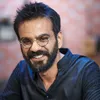Meet Keshava Guha who brings Harry Potter fans a fun new read with his debut novel, Accidental Magic
Author Keshava Guha speaks about his debut novel in an exclusive interview with YS Weekender...
"It is our choices, Harry, that show what we truly are, far more than our abilities,” is a famous quote that Professor Dumbledore says to the young wizard Harry Potter.
Keshava Guha has done just that by choosing to tell the story of four different socially adrift individuals whose lives are brought together by the J.K Rowling series. For Kannan, Curtis, Rebecca and Malathi, the world of Harry Potter is everything. Set in 2001, primarily in the cities of Boston, Chennai and Bengaluru, the novel encompasses themes such as fandom, identity, aspirations and relationships.

Keshava Guha (Image Credit: Bipin Pradip Aspatwar)
Harper Collins India describes the book as: An extraordinary novel about how flawed relationships can be; how we battle loneliness, live on hope and search for that perfect connection-often settling for imperfection-it is also about the tension between duty and the individual pursuit of happiness. Accidental Magic is a work of great imagination and marks the arrival of an exciting and powerful new voice.
Indian writer Aravind Adiga has said of the novel: ‘A terrific debut. Sparkling, very (very) funny, and deeply moving’ while American writer Gary Shteyngart has gone to say that the book is “Truly something different, and exhilarating.”
Having launched the book at the Bangalore Literature Festival that took place last weekend (Nov 9-10th.) Accidental Magic is an ode to the wizarding world of Harry Potter.
In an exclusive interview with YS Weekender, author Keshava Guha talks about the launch of his debut novel, the painstaking writing process, the amount of patience and perseverance that was required, and much more…
YS: Tell us how the idea of Accidental Magic came about? How did you choose to go with themes, like fandom, identity, aspirations and relationships?
KG: Writing fiction for me usually starts with the characters rather than with a topic or a setting. In this case, I was living in the US, in Boston, where I did my undergrad, and two or three of the characters in the book started to appear to me as individuals. I had this idea that they were from Boston with very different backgrounds, and I was interested in creating a world/community where people who would never otherwise meet would meet and whose lives would intersect in some way.
I had been very active in Harry Potter fandom as a child and so I knew about this world, and I remembered there had been these communities where people in Boston would meet, and since my characters were in Boston that made a lot of sense. It was a community where you could be from any background, you could be young or even old, or from any walk of life, and there was still a place for you.
YS: Why did you choose to write fiction? Your father, Ramachandra Guha, writes a lot of non-fiction. How has he influenced you?
KG: I’ve read most of my father’s books. I would say that what my father does is primarily a work of scholarship. His writing is based on a lot of research, a lot of work in the archives and putting this together as a story.
I’ve always wanted to write fiction, partly because I grew up reading a lot of fiction. The second reason is because I have always had an interest in other people. Reading fiction and writing fiction is one way to think what it is like to be somebody else. For example, if I see a couple, I often wonder “Is their marriage a happy marriage? What’s it like underneath the surface? Those kinds of things.”
What is unique about fiction as compared to other forms of writing is that you get to go into somebody’s head. So, when you know someone and you meet them, at the end of the day you can never know what they were thinking. You only see what they want you to see on the surface. So, writing fiction and reading fiction takes you one step further into consciousness.
YS: Did you ever contemplate other forms of creative writing- like becoming a playwright or poet for instance?
KG: Being a playwright has never crossed my mind. I do read a lot of poetry but I don't think I have talent in that direction at all. The only thing that I might try at some point is screen writing because I actually think this is something closer to fiction.
YS: How did you decide on the idea of setting the plot in three different cities, namely Boston, Bengaluru, and Chennai?

Keshava Guha's novel, Accidental Magic was launched at the Bangalore Literature Festival
KG: The main action of the book is largely set in Boston, but to go back to what I said in the beginning, everything stems from the characters. So, the book was originally about three people Kannan, Rebecca, and Curtis. They were all in Boston, and the book was about people who were in the same place, but would never otherwise meet.
It was partly inspired because I lived in Boston and studied there. I had never lived in Madras but I have travelled there multiple times in my life. In Malathi’s case she came a little later into the book. And for most of the book she is not in the same place as all the other characters. When I thought of Malathi, I felt like she had to be from Madras, as this would be something different.
YS: Are the characters, Kannan, Curtis, Rebecca, and Malathi, people you have encountered in real life? Do they possess traits of individuals you grew up with or knew?
KG: None of the characters are based on somebody. They have many individual qualities, but they are taken from so many different people that not any one of them I can say is inspired by this or that person.
YS: Since there are extensive references to Harry Potter, did you have to get permission from J.K Rowling?
KG: You don’t. It’s a tricky thing. If I used Ron and Hermione as actual characters in my book then I would have to ask her, but since the characters in Accidental Magic are discussing her book it’s no different than... Let me give you an example: There is a Woody Allen film called Play it again, Sam, where there is a character who is obsessed with Casablanca, but that is not the same as using the plot line of Casablanca or the characters from it. So, I didn’t need to ask permission.
YS: What is your style of writing? How do you discipline yourself?
KG: With this book, it was mostly written during the afternoons and the evenings. The key here is to think of it as work. A writer whom I’ve forgotten the name of once said, you should think of yourself as being a shopkeeper, you go into the shop every day, you open the shop, and then you close it at the end of the day. Now in between there will be some days when many customers come in and some days when no customers come in, but you still need to keep the shop open.
I think that this is very good advice, because it tells you that this is a job, It’s not about doing it when you feel like doing it, you just do it because it's your job.
In terms of style of writing, I write quite slowly. I like to get things as right as possible the first time. Of course, I revise and edit later but I don't quickly try to get it down on paper. The process is quite painstaking.
There is no one right way of writing. There are many writers out there who think it’s very important for them to get the story down. So, they write the first draft quickly. I am not like that. I take a lot of time for every paragraph and every page.
YS: What are some books that you have read personally which have inspired you in life? Why?
KG: I think one book that would definitely come to mind, which I read around 7-8 years ago, is The Savage Detectives by Roberto Bolano. I think it’s a book about how much books can mean to people and how people’s lives can be defined and shaped by books and writing.
A couple of writers who have influenced my own writing are Penelope Fitzgerald, an English Booker Prize winning novelist, as well as Spanish writer Javier Marias.
Another author who has inspired me, is Philip Roth, an American writer.
YS: Do you think everyone has a book in them?
KG: This is what I will say to that, and this might not be the answer people might want to hear but of course all people have ideas, but just because you have learned how to write in school, doesn't mean that you can write a book. Writing itself is a craft. It takes a lot of work. To say that ‘everyone has a book in them’ is to say everyone has a symphony in them, or an exhibition of artwork in them.
So firstly, in order to write well you have to have read a lot. And you have to think a lot about what it is you want to write, and what it ultimately means. So yes, everybody probably has an idea for a book in them, but to achieve that idea is probably going to take some talent, but more than that a real amount of application.
The thing I most notice with young aspiring writers, which worries me today, is that many of them don't actually like reading. And if you don’t like reading than you shouldn't be writing. It’s as simple as that.
YS: What do you enjoy doing apart from writing over the weekend?
KG: I’m a very serious sports fan. I love cricket and football. I support Arsenal football club, watch a lot of test cricket and I also like to read a lot outside of fiction, such as books on history and politics.
YS: What are your plans for the future.
KG: I am working on another book, and it will take some time, I want to keep writing novels as long as anyone will publish them. You need to keep going forward as you would like a musician or painter. When you finish one piece of work, you need to move on to the next.
YS: What is your advice to other aspiring writers?
KG: Read, read, read. The two most important qualities that anyone who wants to be a writer needs to have are: a love of reading and patience.
For a few lucky people, and I wasn't one of them, things happen immediately. You get picked up by an agent and publisher immediately. For me, that is not how it happened. One of my favorite writers, who I find very inspiring is Penelope Fitzgerald. Her books only started getting published after the age of sixty. She won the Booker Prize and she became very famous, but it takes different people, different lengths of time. You are going to face lots of rejections, and even J.K Rowling did, and so patience is the most important quality. It is just not a field, in which things happen automatically and quickly.
Image credits: Bipin Pradip Aspatwar










